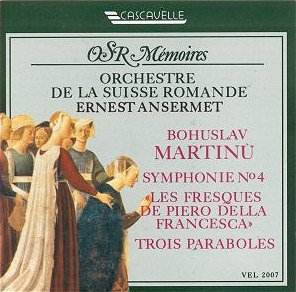Cascavelle is a small Swiss label the catalogue of
which is distinguished by a substantial number of discs of the music
of Frank Martin and by this one of music by a composer whose home for
several years was Switzerland.
Cascavelle's 'OSR Mémoires' series includes
Ansermet conducting de Falla's Atlantide, Berg's violin concerto
(Menuhin), Nights in the Gardens of Spain (Casadesus) as well
as several Frank Martin anthologies, the most promising being archive
broadcasts of Le Mystère de la Nativité and Pilate.
I am not sure if they are still available but you could also pick up
discs of radio tapes featuring Beecham in three Mozart symphonies K297,
K385 and K543, Markevich in Le Sacre and his own Psaume and
Fournier in cello concertos by Shostakovich, Martinu and Schumann.
The present three Martinů
tapes were taken by Radio Suisse Romande in live concerts. They are
unsophisticated in sound but the glare is not extreme. More to the point
they capture Ansermet in glowing form.
Ansermet's Frescoes seethe and erupt
in a molten mosaic of sound. Lyrical lines fly and collide in over-brimming
melodic affluence. Ansermet brings out the Stravinskian edginess of
this score but also we hear the sheer flailing violence of the piece
with more impact than in any other recording I have heard.
The Frescoes were composed in Nice in 1955 and
dedicated to Rafael Kubelik who premiered the work in 1956 in Salzburg.
The work is inspired by a series of fresco panels by della Francesca
(1416-1492). The panels are Les suivantes de la reine de Saba;
Le songe de Constantin; Les batailles, autres fresques.
Ansermet is just as vital in the symphony which, for
me, is the most successful of the six. The war-time Fourth is
Martinů's most lyrical, heart-easing and dynamic inspiration -
truly a gripping symphony flooded with light and courage. I was
deeply impressed by the pressure and lively rushing power Ansermet brings
to this work. The impression is given of an orchestra being whipped
furiously along without a trace of gabble or garbled consonants. The
grip might slacken a little in the allegro vivo (II) but not
by much. The wide striding largo of the third movement has more
tragedy about it than I recall from the Martin Turnovsky or Jiri Behlolavek
versions. the former being my reference version, sadly no longer available
on CD. The Poco allegro is furiously exciting though the rhythmic
grip is not as tight as in the Turnovsky.
The Parables,
after poems by George Neveu (librettist of Martinů's opera Julietta
which I hope to review soon in the Supraphon recording) and
Antoine de Saint-Exupery, are in three movements - The Parable of
a sculptor; The Parable of the garden; The Parable of
the labyrinth. It was dedicated to Charles Munch who premiered the
Sixth Symphony in Boston and soon after recorded it in mono with RCA.
The work dates from 1957 and 1958 the first two movements having been
written in Rome and the last one at Paul Sacher's home in Pratteln.
The Parables bubble with imagination and light but there are
other dimensions too. The string writing suggests a Sibelian link -
redolent of the Sixth and Seventh Symphonies and sometimes of Vaughan
Williams Sixth Symphony. In several of the movements a rough-reeded
rustic piping voice suggests Provençal dances or Auvergnat landscapes.
This jostles with a phantasmal or wraith-like element also to be found
in another visionary work of his last years - The Epic of Gilgamesh.
There are notes by Ansermet and they are in French,
German and English.
The present disc was first issued in 1991 and I regret
that it has taken me this long to catch up with it. Would that the BBC Third
Programme had kept its tapes of the Martinu Symphony cycles conducted
by Vilem Tausky in the 1950s and by Christopher Adey and the BBC Scottish
Symphony Orchestra in circa 1974. Does anyone have off-air tapes of
these. I thought Adey excellent in the earlier symphonies. As for Tausky
he is much more than the gifted light music conductor we came to him
know him as via Matinée Musicale and his work with the BBC Concert
Orchestra.
Definitely worth seeking out not least because it provides
evidence that Ansermet was evidently a very much more vital conductor
when in front of an audience than when confronted by the recording studio's
microphones, booms and mixing desks.
Cascavelle have a website
if you have any difficulty in finding the disc.
Provided stereo perfection is not a priority Martinů
enthusiasts will have a major lacuna in their shelves if they do not
have this. Wonderful Martinů playing.
Rob Barnett


